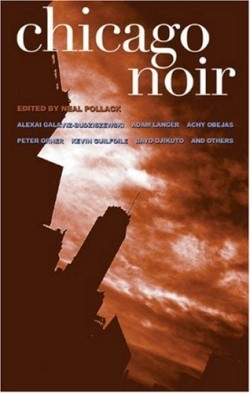Chicago Noir
Thank you, Al Capone. Forget the glittering architecture, the kaleidoscopic public gardens, and the urbane cultural attractions. Ever since Prohibition (at least), Chicago has been saddled with a reputation as the crime capital of the country; an image that, despite such outward appearances to the contrary, it’s not likely to shake any time soon.
Which suits the editor of this gritty anthology just fine.
Marshaling the talents of eighteen award-winning and acclaimed writers, most of whom have professional and/or personal ties to Chicago, Pollack, who worked as a reporter for the Chicago Reader from 1993—2000 and is a regular contributor to Vanity Fair, pays homage to the city that epitomizes the noir genre. Working its way from the mean streets of Chicago’s notorious south side to the allegedly more genteel enclaves of the city’s northern exurbs, the collection revisits the same turf and focuses on the same below-the-radar types that inspired past giants of American literature. And if those giants—from Nelson Algren to Richard Wright—introduced the private Chicago to the world at large, they also did much to instill in Chicagoans themselves a perverse kind of civic pride in these urban badlands and outlaws. They may be gangsters, there may be ghettoes, but, by God, they’re our gangsters and our ghettoes. Whaddy’a goin’ ta do ’bout it?
Hit men, drag queens, ex-cons, and thieves: the characters populating Pollack’s urban landscape typify the noir genre’s criteria of protagonists who are crime perpetrators, not crime solvers. There are no hardbitten cops, no downtrodden PIs leading the way. Cops and PIs, no matter how cynical and jaded, are sworn protectors of society and deserve, if only by default, one’s empathy. Pollack took the greater challenge: make society’s de facto bad guys sympathetic, sometimes even noble, characters. Witness C. J. Sullivan’s tragic boxer, Alex Pinto, a down-on-his-luck former world champ who commits murder in a misguided, but understandable, effort to restore his honor. Even Jim Arndorfer’s football-obsessed but otherwise mild-mannered management consultant from the tony suburbs resorts to violence when sufficiently threatened.
Demonstrating crisp, riveting pacing, dialog redolent with sardonic despair, and dark, nihilistic atmosphere, nearly all the entries are stellar examples of noir at its best. As Andrew Ervin’s nameless anti-hero muses in a stream-of-consciousness letter to his dead lover in “All Happy Families,” “I never expected you to pull an Anna Karenina. Must have been right here somewhere. With trains coming and going both directions in the stub-end tracks make Union Station, and I guess all of Chicago, a unique kind of crossroads. Doesn’t happen anywhere else in the country. Another reason to admire this city.”
Here are eighteen more. Thank you, Neal Pollack.
Reviewed by
Carol Haggas
Disclosure: This article is not an endorsement, but a review. The publisher of this book provided free copies of the book to have their book reviewed by a professional reviewer. No fee was paid by the publisher for this review. Foreword Reviews only recommends books that we love. Foreword Magazine, Inc. is disclosing this in accordance with the Federal Trade Commission’s 16 CFR, Part 255.

